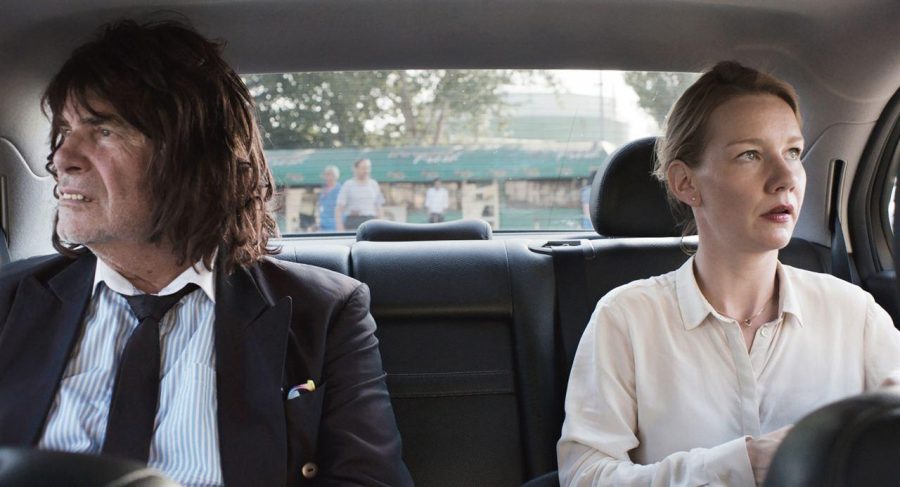By Austin Henderson
Toni Erdmann treads familiar territory. The trope of an independent movie examining the deep questions of life is not anything new. However, director Maren Ade attacks the themes of life’s meaning, the passing of time, and the nature of happiness in a fresh way. Rather than proselytizing, these issues are examined with the constant presence of a wry, witty humor.
The film deals with the attempts of Winfried (Peter Simonischek), an aging hippie, to reconnect with his adult daughter Ines (Sandra Hüller), who is immersed in the corporate culture of continental Europe. Their personalities offer a constant juxtaposition, Winfried allowing hardly a minute to be passed without a prank (a pair of fake teeth are a near constant accessory for the character), while Ines is overstressed and constantly inundated and in communication with her taxing job.
The audience is first introduced to Winfried on his porch in a small German town. Cloaked in a bathrobe, the aging divorcee is busy with an elaborate ruse to confuse a man delivering a package to the residence. In his lonely life, he takes solace in a close relationship with his aging dog. Following the death of his dog, he takes a leave of absence from teaching music at a local school to visit his estranged daughter, who works as a consultant for an oil company in Bucharest.
From the moment Winfried unexpectedly arrives in Romania, the air is tense between the two. Ines is embarrassed by the constant comedic antics of her father that she fears will ruin her professional reputation. The visit ends on sharp terms, with Ines asking her father, “Do you have any plans in life other than slipping fart cushions under people?”
After Winfried leaves, Ines feels awful for the admonishment and thinks she has seen the last of her father for a while. Then one night while at a restaurant with a group of friends a man with a shocking resemblance to her father introduces himself to the group.
Winfried, sensing his daughter’s lack of happiness in her corporate life has returned, albeit with a pair of fake teeth and an atrocious wig.
In a further development of his alter ego Toni Erdmann, Winfried claims to be among other things, a lifestyle coach for the company and the German ambassador to Romania. His unorthodox approach to reconnecting with his daughter brings her great consternation, but in the end both learn a great deal from one another.
Beyond the critique of the overstressed and hectic nature of corporate life, the film deals heavily with themes of unequal economic development within Europe, the ethics of business, and sexism in the workplace
While at first glance Ines is portrayed as cold and dismissive towards the idealistic notions of her father, it is later shown that she has had to develop this façade to be taken seriously by her colleagues, in the boys’ club of her company.
In Toni Erdmann Ade delivers an intensely watchable film that despite its three-hour length and subtitles maintains an aura of accessibility in its developed characters and high amount of comedic relief.
Toni Erdmann is playing at FilmScene, 118 E. College St., through the week. Cost and showtimes vary, see www.icfilmscene.org







